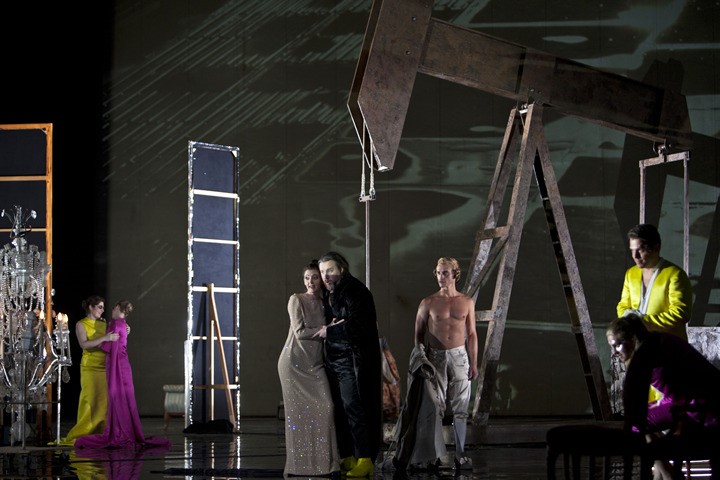 Germany Mozart, Così fan tutte: Orchestra and Chorus of the Deutsche Oper / Donald Runnicles (conductor), Deutsche Oper, Berlin, 14.10.2016. (JMI)
Germany Mozart, Così fan tutte: Orchestra and Chorus of the Deutsche Oper / Donald Runnicles (conductor), Deutsche Oper, Berlin, 14.10.2016. (JMI)

Cast:
Fiordiligi – Nicole Car
Dorabella – Stephanie Lauricella
Ferrando – Paolo Fanale
Guglielmo – John Chest
Don Alfonso – Noel Bouley
Despina – Alexandra Hutton
New Production:
Director and Sets – Robert Borgmann
Costumes – Michael Sontag
Lighting – Carsten Rüger
Video – Lianne van de Laar
The Deutsche Oper has programmed five new productions this season, the first of which is Così fan tutte. Unfortunately, the production did not meet my expectations, particularly with regard to the staging.
Robert Borgmann is making his debut in opera, and it has not been a great success. Many directors today, especially in Germany, need to demonstrate their originality in addition to their profound thoughts (which often require an accompanying treatise in order to be understood by the audience). And this is what has happened here. Mr. Borgmann decided to convert the dramma giocoso (as Mozart and Da Ponte defined it) into an opera buffa during the first half. Of course, this requires a great sense of humour, but that seemed to be missing. The truth is that his intentions are hard to understand as, for example, when he introduces seven extras during the overture, all dressed in eighteenth-century clothes as if they were attending a performance. Even more incomprehensibly, they change into modern dress to attend the final scene. The meaning of it all escapes me, and even more so when Guglielmo sings ‘Non siate ritrosi’ to one of them rather than to the Ferrara sisters.
There are no sets but rather a turntable that rotates non-stop throughout the performance, with a screen at the back for the projection of images and a number of props: some sort of tree in Act I and a series of strange elements in the second, among them a huge tool to drill oil. As Mimi says, ‘il perché non so’. The costumes are modern, and attractive in the case of the two sisters, but no more than colourful and somewhat clownish for their lovers.
Così fan tutte is not an easy opera to stage, and this production is ultimately a tedious, boring one.
One of the draws at the Deutsche Oper was the presence of Donald Runnicles in the pit. I’ve had many opportunities to see this excellent conductor in this theatre, and he has always been outstanding, especially in the German repertoire, but this time his conducting was unconvincing. I missed more delicacy and lightness in his reading, which are so necessary in Mozart, and even more inspiration. However, both the orchestra and the chorus gave fine performances.
Most opera lovers will agree that the most important – and the most difficult – character is Fiordiligi, a role that makes great vocal demands of any soprano. The interpreter was Australian soprano Nicole Car, and she did well in the part. Her voice is nicely suited to the role, although she sometimes fell a little short at the low notes, as often happens with any Fiordiligi.
American mezzo-soprano Stephanie Lauricella gave life to Dorabella, and she too was good. Her voice is attractive and homogenous, but it’s somewhat reduced in size. I would prefer a mezzo with more weight in her voice.
Sicilian tenor Paolo Fanale made a strong impression as Ferrando, and sang ‘Un aura amorosa’ brilliantly. He has a beautiful, well-handled voice, and is a very interesting Mozart tenor.
American baritone John Chest was a correct Guglielmo, although I missed a darker voice in the character. Noel Bouley was fine in acting terms as Don Alfonso, but rather modest in vocally. Finally, soprano Alexandra Hutton as Despina was easy on stage, but her voice is too light.
José M. Irurzun
